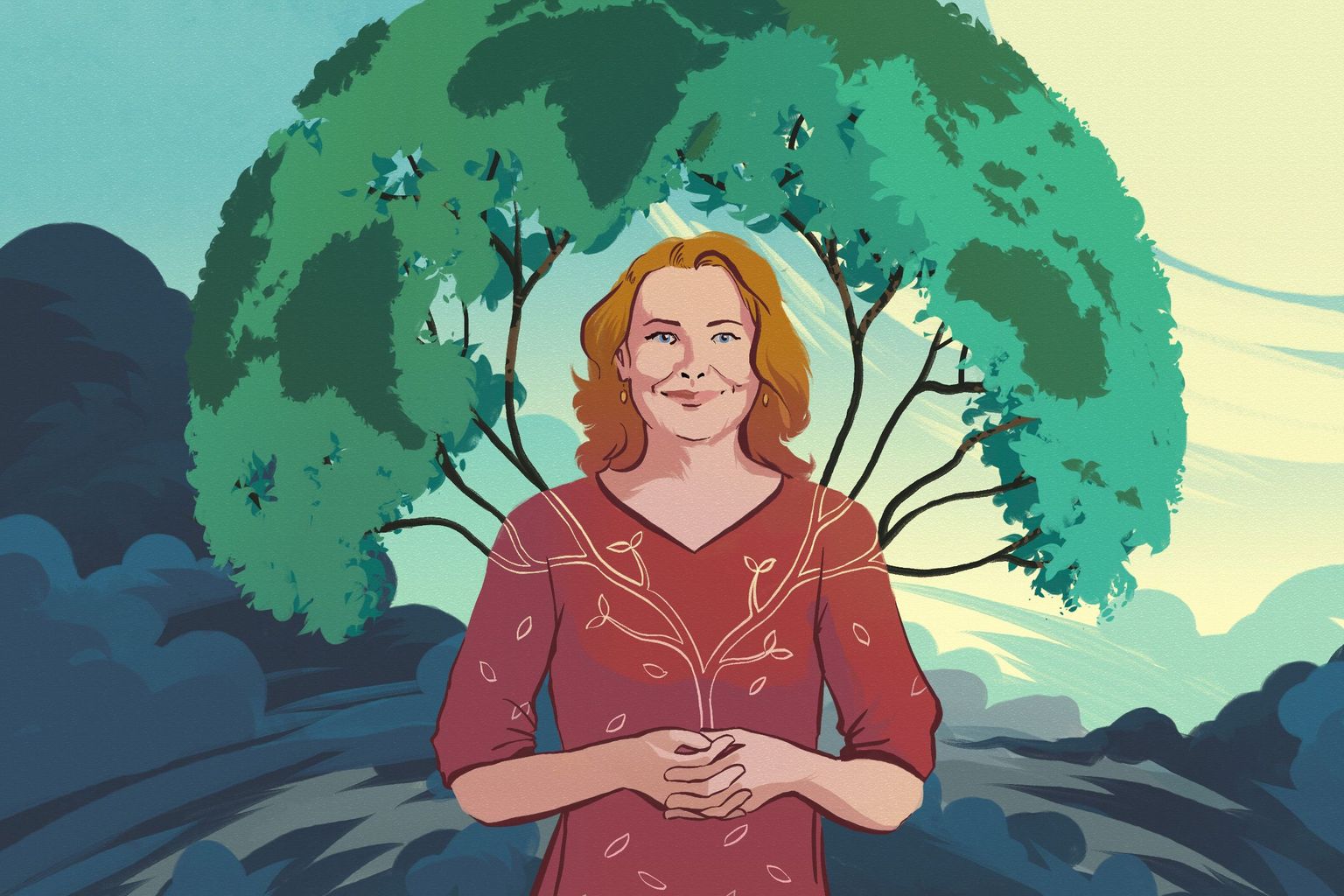
Illustration by Jon McCormack
As Claire O’Rourke watched Anthony Albanese declare victory at the Australian federal election in May, she was hit with a sign from the universe that her new book, Together We Can, a non-fiction account of the many Australian efforts to take action on climate change, had at the very least been blessed with a title that captured the moment.
“It was just really surprising that the new prime minister said ‘together we can’ about four times in his victory speech,” O’Rourke says. “I’d already picked it as the title of my book, and I was just like, Wow, this is what the moment is calling for. It’s what’s in the zeitgeist.”
The hope-tinged spirit that O’Rourke is referring to (and which her book is now neatly slotting into) can be seen in the growing number of climate stories being told that emphasise optimism and collective action. That list includes Cate Blanchett and Danny Kennedy’s Climate of Change podcast, the Australian podcast A Positive Climate, and Paul Hawken’s book Regeneration: Ending the Climate Crisis in on Generation.
O’Rourke, whose CV boasts stints as the national director of Solar Citizens, a community advocacy group representing Australia’s solar-powered households, found the spark to write the book in the depths of despair during the Black Summer bushfires of 2019/2020.
“I went through a kind of crisis of hope,” she says down the line from her home office. “We had to pack up our own home with our essentials and be ready to evacuate from our home just north of Wollongong. It seemed a bit incongruous to have to go through that experience while living basically in a suburban area. And that was when I had my freak-out moment.”
At around the same time, O’Rourke was working on Climate Compass, a social research effort that gauges the views of Australians on climate change. The project, a part of her current role with climate change NGO The Sunrise Project, found that 24 per cent of Australians—or around five million people—were alarmed about the state of the environment. O’Rourke saw she was part of a huge and growing cohort.
“I realised I wasn't alone, which was kind of gratifying,” she says. “To know that there are almost five million Australians feeling similar to yourself… it made me understand that people have an enormous appetite to think of how they can claim their agency and be part of this solution.”
Together We Can would become O’Rourke’s letter to that 24 per cent—a collection of real-life examples of people like them who had joined together to take action and shift systems. She wanted to offer those five million anxious Australians solid proof that there was something to be hopeful about—and that hope could save us from the end of the world.
While hope may be the most useful narrative of the current moment, O’Rourke cautions against false or myopic positivity.
O’Rourke says the book, and the more positively inclined zeitgeist it is an expression of, was a necessary corrective to the knee-jerk response we often have to massive obstacles. “Humans are really great at chronically underestimating how quickly we can solve problems,” O’Rourke says. “We are really great at not realising how quickly we can influence systems and how quickly we can make change happen.”
One of O’Rourke’s favourite examples of lightning-fast community-level action is the story of Phoebe Howe, the young climate campaigner who returned from the failure of the Copenhagen Climate Change Conference in 2009. Fired up, Howe proceeded to launch a successful campaign for the ACT to cut its carbon emissions by 40 per cent.
Former ACT Chief Minister Simon Corbell told O’Rourke that Howe’s campaign was so successful that it created the space for the government to pursue other goals, like the ambitious agenda it set to create reverse auctions for renewable energy—a policy that has since been replicated in Victoria, NSW and Queensland, and made a significant contribution to Australia hitting its 30 per cent renewables target. And it all started with Phoebe Howe.
“The challenge now for us as storytellers within the climate movement—and also through the business sector and through government—is to be good communicators around how people can actually participate in the solution that's systemic,” O’Rourke says. Individual actions like refusing to use plastic shopping bags are important, but can feel like a microscopic contribution to an all-encompassing challenge. And that feeling can lead to a sense of hopelessness, which can in turn lead to inaction.
Enter O’Rourke’s bigger stories, which can have the opposite effect. “People really need to see the connection between what they do as an individual and how it can create conditions within a system. How are you creating the conditions for positive tipping points to occur within the system?” The best way, she argues, is by telling stories—ones about real people doing tangible things to solve the problems facing us. Which is exactly what she has done with Together We Can.
All of which poses the question: should the environmental movement have been telling these stories decades ago, instead of focusing on facts and figures, policy frameworks and doom-laden warnings about rising sea levels? It’s a suggestion O’Rourke pushes back against. “You can look back with hindsight and go, Well, yes, we should have changed that part of the narrative then and this part of the narrative at this point.” But, she says, you need different types of stories at different times. “At certain points the public did need to be educated about the problem, [and] we needed to make sure that our decision-makers were hearing the factual messages loud and clear.”
While hope may be the most useful narrative of the current moment, O’Rourke cautions against false or myopic positivity—a trend afflicting an increasing number of ‘good news’ climate stories. “‘Hopium’ is how some folks describe it,” she says, “a hope that is hollow and useless because it lulls people into a false sense of security.”
Working out how to differentiate useful hope from its destructive counterpart may be one of the most pressing challenges facing storytellers in the environmental space today. But the path toward climate action has always been rocky—a fact no less true for climate communicators than scientists and politicians. O’Rourke and her fellow storytellers have a precarious walk ahead of them, one requiring a balance of positivity and urgency. With Together We Can, she’s shown that it’s possible to chart that path.
